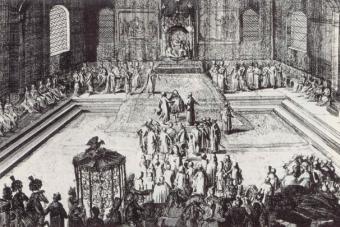#D43//4dm
WHITE ACACIUM BUNKLES FRAGRANT…
Music by unknown author
Words by A. Pugachev (?)
Full of fragrance again
In the quiet glow of the wonderful moon!
Do you remember the summer, under the white acacia
Have you heard the song of the nightingale?
"Honey, believe me! .. forever yours."
The youth of life has passed
White acacia scent gentle,
Believe me, I will never forget ...
<1902>
First published in 1902 in the series "Gypsy Nights" without indicating the name of the author of words and music. Later it was published as a "famous gypsy romance" edited by Varia Panina and musically arranged by A.M. Zorin, but also nameless. Nevertheless, it is believed that the basis of the text is a reworking of Pugachev's poem. But in some sources, Volin-Volsky is called the author of the text (his romance to the music of M. Sharov "A tear clouds my eyes" is known), and the author of the music is M. Sharov or A. Lutsenko. The version about the authorship of Pugachev, who owns more than three dozen romances to the music of M.K., remains the most stable. Steinberg, J. de Bothari and other romance composers. Many of these romances entered the repertoire of the most famous pop singers as "gypsy". The most popular romance "White Acacia Fragrant Clusters" was performed by Yuri Morfessi. The chant is used in the revolutionary song "Let's Boldly Go to Battle". In the twentieth century, folklore versions were recorded.
Anthology of Russian romance. Silver Age / Compiled, foreword. and comment. V. Kalugina. Moscow: Eksmo, 2005.
The melody of the romance formed the basis of the popular song of the First World War "Heard, grandfathers, the war has begun" (at the same time, a chorus in the rhythm of the mazurka was added to it) - during the Civil War, its White Guard and Red Army adaptations were created, including the well-known red song "We will boldly go into battle!" .
Under the influence of "White Acacia", the poet Matusovsky wrote the text of a romance for the TV movie "Days of the Turbins" ("The nightingale whistled for us all night...").
OPTIONS (2)
Fragrant bunches of white acacia
Full of fragrance again
The song of the nightingale resounds again
In a quiet radiance, the radiance of the moon.
Do you remember, in the summer under a white acacia
Have you heard the song of the nightingale?
Quietly whispered to me wonderful, bright:
"Darling, forever, forever yours!"
Years have long passed, passions have cooled,
Youth is gone...
Delicate scent of white acacia
I will never forget, never forget!
Talk to me about love: Songbook. Songs and romances. For voice and guitar (piano, synthesizer). St. Petersburg: Composer, 2005.



Old Russian romance. 111 masterpieces. For voice and piano. In four editions. Issue. IV. St. Petersburg: Composer St. Petersburg, 2002.
2. White locust
(Old romance, arr. Y. Morfessi)
white acacia
fragrant branches
They breathe with the delight of spring,
Quietly spread
Nightingale song
In pale sparkle
The sparkle of the moon.
Do you remember at night
Among white acacias
Trills rushed the nightingale,
Gently snuggle
You whispered to me, languid:
"Believe forever
I'm yours forever"?
Time has flown by
And merciless old age
They sent us years
But flavor
fragrant acacias
I can't forget
Never forget.
From the repertoire of Yuri Morfessi (1882-1957)
Black eyes: Old Russian romance. Moscow: Eksmo, 2004.
In general, the same version, only with the signature "the words of A. Volin-Volsky" and the comment "authorship presumably":

white acacia fragrant branches
They breathe with the delight of spring.
The song of the nightingale quietly spreads
In a pale sparkle, the sparkle of the moon.
Do you remember - at night among white acacias
Trills rushed the nightingale?
Gently clinging, you whispered to me, languid:
“Believe, forever, forever I am yours!”
Time has flown by, and merciless old age
They sent us years;
But the scent of fragrant acacias
I will never forget, never forget!
The last two couplet lines are repeated
Burn, burn, my star! / Comp. and music. editor S. V. Pyankova. Smolensk: Rusich, 2004. S. 251-252.
The song of the nightingale resounds again
In the quiet glow of the wonderful moon!
Do you remember summer: under white acacia
Did you hear the song of the nightingale? ...
Quietly whispered to me wonderful, bright:
"Honey, trust me! Forever Yours".
Years have long passed, passions have cooled,
White acacia scent gentle,
Believe me, I will never forget ...
____________________
BURN, BURN, MY STAR!
Words by V. Chuevsky
Burn, burn, my star,
Burn, hello star!
You are my only cherished
There will never be others.
Will the clear night fall on the earth
But you are alone, my beautiful,
You burn in the rays that please me.
blessed star of hope
Star of love of magical days,
You will be forever unstoppable
In my yearning soul!
My whole life is illuminated.
Will I die - you are over the grave
Burn, burn, my star!
____________________
ONLY TIME
Words by P. German
Day and night drops the heart of affection,
Day and night dizzy
Day and night an excited fairy tale
I hear your words:
I want to love so much."
The ray of a forgotten sunset is melting,
Flowers shrouded in blue
Where are you, once made
Where, in me, awakening dreams?
Just once on a cold gray evening
I so want to love.
____________________
THE CHRYSANTHEMS HAVE FLOWED
Words by V. Shuisky
In the garden where we met
And then it blossomed in my chest
The feeling of bright tender love ...
Bloomed a long time ago
Chrysanthemums in the garden
But love lives on
In my sick heart.
Our garden is empty, you are long gone,
I wander alone, all exhausted.
And involuntary tears roll
Before the withered chrysanthemum bush...
Bloomed a long time ago
Chrysanthemums in the garden
But love lives on
In my sick heart...
____________________
BLACK EYES
Words by E. Grebenka
Black eyes, passionate eyes!
Eyes burning and beautiful!
How I love you! How I fear you!
Know that I saw you at an unkind hour!
Oh, no wonder you are darker depths!
I see mourning in you for my soul,
I see the flame in you, I am victorious:
A poor heart is burned on it.
But I'm not sad, I'm not sad.
My fate is comforting to me:
All that is best in life God has given us,
I sacrificed to the fiery eyes!
____________________
GATE
Words by A. Budischev
Only the evening will glow blue
Only the stars will set the sky on fire
And bird cherry silver hoarfrost
Will remove the dew with pearls,
Open the gate carefully
And enter the quiet garden like a shadow.
And put a veil on your head.
Where the branches are thicker,
I'll go invisibly, inaudibly
And on the very threshold of the gazebo
I'll take the veil from my lovely lips.
____________________
DON'T GO, STAY WITH ME...
Words by M. Poyrin Don't leave, stay with me,
It's so nice here, so bright.
I will cover with kisses
Mouth, and eyes, and forehead.
Stay with me,
Stay with me!
I have loved you for so long.
I caress you with fire
And I'll burn, and I'll tire.
Stay with me,
Stay with me!
Passion burns in my chest.
The delight of love awaits us with you,
Don't go, don't go
Stay with me,
Stay with me!
Musical room. Romance. "Fragrant clusters of white acacia".I'm happy that I met you
Unique and wonderful.
And that means I didn't live in vain...
Thank you, my magical Romance!
With the authorship of the romance "White Acacia Fragrant Clusters" ambiguities immediately arose. The text of the romance was first published in 1902 in the series "Gypsy Nights", without indicating the name of the author of words and music. Subsequently, the romance was published as a "famous gypsy romance" edited by Varia Panina and musically arranged by A.M. Zorin, but also untitled. The version about the authorship of A.A. Pugachev, who owns more than three dozen romances to the music of M. Steinberg, D. Botari and other composers, remains the most stable. Music, most likely, belongs to Zorin.
Fragrant bunches of white acacia
Full of fragrance again
In the quiet glow of the wonderful moon!
Have you heard the song of the nightingale?
"Honey, believe me! .. forever yours."
The youth of life has passed
White acacia scent gentle,
Believe me, I will never forget ...
Fragrant bunches of white acacia
Full of fragrance again
The song of the nightingale resounds again
In the quiet radiance, radiance of the moon!
Do you remember the summer, under the white acacia
Have you heard the song of the nightingale?
Quietly whispered to me wonderful, bright:
"Darling, forever, forever yours."
Years have long passed, passions have cooled,
The youth of life has passed
White acacia scent gentle,
I can't forget, never forget...
Gramophone records with recordings of "White Acacia" performed by V. Panina, S. Sergeeva, M. Emskaya, Yu. Morfessi, N. Seversky, the Sadovnikov brothers quickly spread it to all corners of Russia.
The romance became more and more popular.
The melody of the romance formed the basis of the popular song of the First World War "Heard, grandfathers, the war has begun" (at the same time, a refrain was added to it in the rhythm of a mazurka) - during the years of the Civil War, this song was supplemented and remade into the anthem of Denikin's Volunteer Army, which, in its turn, was reborn in the Red Army march "Listen, worker ...". There were also other folkloric variants.
Anthem of the Volunteer Army
The years have flown by… The events of the First World War and the Civil War have sunk into history. The Moscow Art Theater production of "Days of the Turbins" was successfully staged (at least a thousand times!) where the same romance "White Acacia" sounded. The legendary performance was eventually banned, despite the fact that Joseph Stalin personally loved it. The original romance began to be forgotten. “White acacia flowers of emigration,” Ostap Bender sarcastically, the name of the romance became a household name ... In the 1950s, the romance was again remembered and recognized masters of this genre included in their repertoire:
In 1975, the authorities allowed, although not immediately, Vladimir Basov to film the adaptation of Days of the Turbins. The director came to Kyiv to decide where to shoot certain scenes of the famous Kyiv play by the Master. Basov carefully read another Bulgakov's novel - "The White Guard", introduced characters into the film script who are not in the play (for example, Karas). The director was imbued with the mood of Bulgakov's work, the unique atmosphere of the City and turned to his favorite songwriter Mikhail Matusovsky. Here is what the musicologist Yevgeny Biryukov writes: “Beginning the shooting of The Days of the Turbins, Vladimir Pavlovich remembered that in those ancient times, when the action of Bulgakov’s play takes place, the romance “The White Acacia Fragrant Clusters” was in fashion, the melody of which formed the basis of the famous revolutionary songs "We will boldly go into battle". The director wanted the themes of these two songs to sound in the film as a review, an echo, a distant memory of those years, and set such a task for Mikhail Matusovsky and composer Veniamin Basner. This is how two songs appeared in the film. Marching "The song about the armored train "Proletary" did not go beyond the film and did not find a wide sound, which cannot be said about "Romance", as the poet and composer called the reminiscence song about "White Acacia". It is interesting that in the "Song of the Armored Train" the authors used the motives of the song "We will boldly go into battle." In addition, Basov asked the poet that the romance should be "Kyiv, but without mentioning the word Kyiv", like Mikhail Bulgakov, although every reader of the play "Days of the Turbins" and the novel "The White Guard" knows that Mikhail Afanasyevich always has Kyiv called the City. That's right, with a capital letter. Mikhail Matusovsky brilliantly coped with the task. He, remembering how in childhood in his native Lugansk his parents sang old, even pre-revolutionary romances, offered Basov fragrant clusters as the basis for "White Acacia". The poet specially came to Kyiv, visited Andreevsky Spusk and the Turbin House, saw a flowering acacia in Kyiv gardens, "washed by spring showers" ... For the size of the verse, one could also use "Kyiv was silent ...", but he was silent in the romance City, that is, in fact - Kyiv. The poet conveyed his mood to the composer Veniamin Basner, who creatively reworked the melody of the old romance, composing a beautiful melody, original and, at the same time, reminiscent of the former one.
In separate publications, I had to read that almost a single verse of romance sounded in the film, as you can see, this is not so. The romance sounds completely, but with slightly different verses from those that have become familiar. Almost immediately after the premiere of the television movie, Lyudmila Senchina came to the dacha of Veniamin Basner with a request for new songs for her. The composer offered her a slightly revised version of "White Acacia". There she is:
Let's listen to the same romance in a different version:
With the authorship of the romance "White Acacia Fragrant Clusters" ambiguities immediately arose. The text of the romance was first published in 1902 in the series "Gypsy Nights", without indicating the name of the author of words and music. In the summer of 1903, the St. Petersburg Musical Printing House of V. Bessel and Co. in the series "Gypsy Songs of N.P. Lyutsenko" published a clavier of the romance "with vocal parts for tenor and soprano." Subsequently, the romance was published as a "famous gypsy romance" edited by Varia Panina and musically arranged by A.M. Zorin (the real Cymbal), but also untitled. The version about the authorship of A.A. Pugachev, who owns more than three dozen romances to the music of M. Steinberg, D. Botari and other composers, remains the most stable. Music, most likely, belongs to Zorin.
Full of fragrance again
In the quiet glow of the wonderful moon!
Have you heard the song of the nightingale?
"Honey, believe me! .. forever yours."
The youth of life has passed
Believe me, I will never forget ...
1903
Fragrant bunches of white acacia
Full of fragrance again
The song of the nightingale resounds again
In the quiet radiance, radiance of the moon!
Do you remember the summer, under the white acacia
Have you heard the song of the nightingale?
Quietly whispered to me wonderful, bright:
"Darling, forever, forever yours."
Years have long passed, passions have cooled,
The youth of life has passed
White acacia scent gentle,
I can't forget, never forget...
Y.Morfessi variant
white acacia fragrant branches
They breathe with the delight of spring,
The song of the nightingale quietly spreads
In a pale sparkle, the sparkle of the moon.
Do you remember at night among the white acacias
Trills rushed the nightingale,
Gently clinging, you whispered to me, languid:
"Believe, forever, forever I'm yours"?
Time has flown by, and merciless old age
They sent us years
But the scent of fragrant acacias
I can't forget, never forget
In some sources, Volin-Volsky is called the author of the poems (his romance to the music of M. Sharov "A tear clouds my eyes" is known), and the author of the music is M. Sharov or A. Lutsenko.
Gramophone records with recordings of "White Acacia" performed by V. Panina, S. Sergeeva, M. Emskaya, Yu. Morfessi, N. Seversky, the Sadovnikov brothers quickly spread it to all corners of Russia.
The romance became more and more popular.
Maria Emskaya
Nikolai Seversky
The melody of the romance formed the basis of the popular song of the First World War "Heard, grandfathers, the war has begun" (at the same time, a refrain was added to it in the rhythm of a mazurka) - during the years of the Civil War, this song was supplemented and converted into the anthem of Denikin's Volunteer Army, which, in in turn, was reborn into the Red Army march "Listen, worker ...". There were also other folkloric variants.
Anthem of the Volunteer Army
Grandparents heard - the war began,
Quit your business, get ready for a hike.
We will soon finish with the enemies of calculations.
We will boldly go into battle for Holy Russia
And as one we shed young blood.
Here are the red chains
We will fight them to the death.
We will boldly go into battle for Holy Russia
And as one we shed young blood.
We will honor them with military formation.
We will boldly go into battle for Holy Russia
And as one we will shed young blood ..
Russia was invaded by alien forces,
Honor disgraced, the temple defiled.
We will boldly go into battle for Holy Russia
And as one we shed young blood.
From the power of countless through hard times
The honor was defended by the cadets and cadets.
We will boldly go into battle for Holy Russia
And as one we shed young blood.
For Holy Russia "We will boldly go into battle"
Listen, worker, the war has begun:
Quit your job, get ready for a hike!
Shells are bursting, machine guns are cracking,
But the red companies are not afraid of them.
Boldly we will go into battle for the power of the Soviets
And as one we will die fighting for it.
Here are the white chains
We will fight them to the death.
Boldly we will go into battle for the power of the Soviets
And as one we will die fighting for it.
Eternal memory to the fallen heroes,
Eternal glory to those who live!
Boldly we will go into battle for the power of the Soviets
And as one we will die fighting for it.
KrAPP SA im. Alexandrova
Chorus VR
Ensemble "Ark"
The years have flown by… The events of the First World War and the Civil War have sunk into history. The Moscow Art Theater production of "Days of the Turbins" was successfully staged (at least a thousand times!) where the same romance "White Acacia" sounded. The legendary performance was eventually banned, despite the fact that Joseph Stalin personally loved it.
The original romance began to be forgotten. “White acacia flowers of emigration,” Ostap Bender sarcastically, the name of the romance became a household name ...
In the 1950s, the romance was again remembered and recognized masters of this genre included in their repertoire:
Alla Bayanova
Georgy Vinogradov and Pyotr Medvedev
Nadezhda Obukhova
Boris Shtokolov
In 1975, the authorities allowed, although not immediately, Vladimir Basov to film the adaptation of Days of the Turbins. The director came to Kyiv to decide where to shoot certain scenes of the famous Kyiv play by the Master. Basov carefully read another Bulgakov's novel - "The White Guard", introduced into the script of the film characters who are not in the play (for example, Karas). The director was imbued with the mood of Bulgakov's work, the unique atmosphere of the City and turned to his favorite songwriter Mikhail Matusovsky.
Here is what the musicologist Yevgeny Biryukov writes: “Beginning the shooting of The Days of the Turbins, Vladimir Pavlovich remembered that in those ancient times, when the action of Bulgakov’s play takes place, the romance “The White Acacia Fragrant Clusters” was in fashion, the melody of which formed the basis of the famous revolutionary songs "We will boldly go into battle". The director wanted the themes of these two songs to sound in the film as a review, an echo, a distant memory of those years, and set such a task for Mikhail Matusovsky and composer Veniamin Basner. This is how two songs appeared in the film. Marching "The song about the armored train "Proletary" did not go beyond the film and did not find a wide sound, which cannot be said about "Romance", as the poet and composer called the reminiscence song about "White Acacia".
It is interesting that in the "Song of the Armored Train" the authors used the motives of the song "We will boldly go into battle."
In addition, Basov asked the poet that the romance should be "Kyiv, but without mentioning the word Kyiv", like Mikhail Bulgakov, although every reader of the play "Days of the Turbins" and the novel "The White Guard" knows that Mikhail Afanasyevich always has Kyiv called the City. That's right, with a capital letter.
Mikhail Matusovsky brilliantly coped with the task. He, remembering how in childhood in his native Lugansk his parents sang old, even pre-revolutionary romances, offered Basov fragrant clusters as the basis for "White Acacia". The poet specially came to Kyiv, visited Andreevsky Spusk and the Turbin House, saw a flowering acacia in Kyiv gardens, "washed by spring showers" ... For the size of the verse, one could also use "Kyiv was silent ...", but he was silent in the romance City, that is, in fact - Kyiv. The poet conveyed his mood to the composer Veniamin Basner, who creatively reworked the melody of the old romance, composing a beautiful melody, original and, at the same time, reminiscent of the former one.
In separate publications, I had to read that almost a single verse of the romance sounded in the film, as you can see, this is not so. The romance sounds completely, but with slightly different verses from those that have become familiar.
Almost immediately after the premiere of the television movie, Lyudmila Senchina came to the dacha of Veniamin Basner with a request for new songs for her. The composer offered her a slightly revised version of "White Acacia". There she is:
All night the nightingale whistled to us,
The city was silent and silent at home.
Fragrant bunches of white acacia
They drove us crazy all night long.
The whole garden was washed by spring showers,
There was water in the dark ravines.
God, how naive we were
How young we were then.
Years have flown by, making us gray-haired,
Where is the purity of these living branches?
Only winter and this white blizzard
Remind them today.
At the hour when the wind rages furiously,
With new strength I feel:
Fragrant bunches of white acacia
Irrevocable, like my youth.
Fragrant bunches of white acacia
Unique as my youth.
And the triumphal procession of the renewed romance began:
Valery Agafonov
Lyubov Isaeva
Gennady Kamenny
Boris Kletinich
Joseph Kobzon
Mikhail Novohizhin
Vyacheslav Olkhovsky
Maria Pakhomenko
Lyudmila Senchina
Leonid Serebrennikov
Eduard Khil
Galina Khomchik
Zhanna Cherkashenko
Anna Shirochenko and Leonid Serebrennikov.
And, of course, YEVGENY DYATLOV. 
For some reason, the romance did not sound in the film "White Guard" ...





